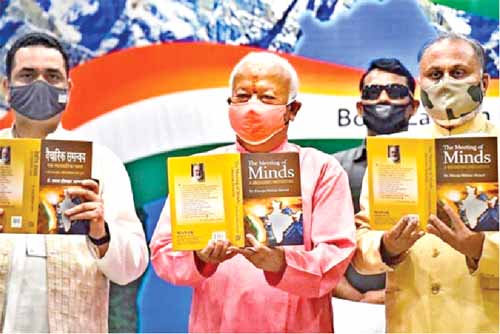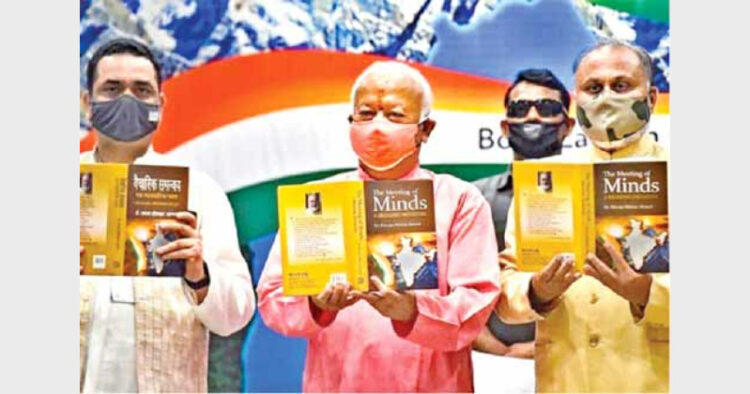
RSS Sarsanghchalak Dr Mohan Bhagwat releasing Dr Khwaja Iftikhar Ahmed’s book,
The Meeting of Minds: A Bridging Initiative, on July 4, 2021, in Delhi
The Meeting of Minds: A Bridging Initiative, on July 4, 2021, in Delhi
The Muslim question of assimilation is a global issue. Bharat also has been facing the same for since the arrival of Islam. The issue was addressed by the Sarsanghchalak of Rashtriya Swayamsevak Sangh (RSS) Dr Mohan Bhagwat, with a Sangh formula of socio-cultural assimilation. Naturally, the book-launch function organised by Muslim Rastriya Manch naturally got the media attention. ‘DNA of of Bharatiyas is the same’ and ‘the people who are lynching others are going against Hindutva’ are the two statements around which entire discussion took place. Based on these two assertions, five key conclusions were drawn and certain questions were raised by the self-proclaimed protectors of the Hindu interests, especially in the social media space. Their intention may not be wrong but understanding of the message is certainly defective and damaging. To get the clarity on the Muslim question, we need to decode the speech to allay the apprehensions:
1. Has Sangh diluted the concepts of Hindutva and Hindu Rashtra?
Since Doctor Hedgewar initiated the Sangh work, organising Hindu society for the national reconstruction through character building has been the core activity of the RSS. Sri Guruji Golwalkar articulated the concept of being Hindu based on motherland, culture and ancestry as the common factors. Whoever believe in these fundamentals and ready to work for their pride is a Hindu. Sarsanghchalak Mohan Bhagwat reiterated this position in front of the Muslim intellectuals. In no way, the core understanding of Hindutva (Hinduness) – that is the spiritual way of life, acceptance and respect for the all ways of worship and manifestation of Dharma that connects with others in all spheres of life – gets diluted because of this. Hindustan is a Hindu Rashtra was the unequivocal statement made by the Sarsanghchalak at least twice because of which the uniqueness of Hinduness is prevalent in our society. Different sects of Islam are living peacefully only in Bharat due to this Hindu character of the society. Whether to recognise this fact and adopt the path of mutual respect is up to the Muslim leadership. Sangh has expressed the openness for dialogue from the position of strength. This is in no way dilution of Hindutva or Hindu Rashtra.
2. Is Sangh is getting into appeasement politics?
As the Uttar Pradesh elections are around the corner and the book-release function was in the same state, many tried to paint the exercise as the political one. As the Sarsanghchalak himself clarified in the beginning, it was an invitation by a Muslim group. Due to the Covid-19 pandemic, the proposed date had to be postponed trice. Sangh never bother about what others would think about its work or thought process. Inculcating sincerity and commitment to the cause of national reconstruction is the process and objective of the Sangh. National interest is paramount not the political or party interests. If RSS had to get into appeasement, there was no need to talk about the harsh historical realities and long-term efforts.
3. Has Sangh singled out the Hindu fringe and given a message to them?
The RSS Sarsaghchalak was addressing to a Muslim group on the forum created by Muslims and for Muslims. The address was not for the Swayamsevaks or the Hindu society. While explaining the true nature of Hindu thought, he just repeated what he had said in his earlier speeches. No one should take law in the hands. If any crime has taken place and impartial inquiry should be conducted and action should be taken as per the law. This applies to everyone. So this was not a singling out of any community or group.
If certain acts are carried out against the national interest, prominent voices should come out to denounce that, as happens from the Hindu society, was the clear message
4. Is the DNA of Sangh Swayamsevaks and Muslims indulging in terror act are the same?
Most absurd kind of questioning was done when Islamist terrorists were equated with the Sarsanghchalak or RSS Swayamsevaks. Most of the Muslims in Bharat are converted is a fact. As per the Islamic tenets they may not believe in ancestry as the common point of unity. Still, in personal lives, many Muslims still follow the family traditions which are unilsamic in nature. After putting forth the two fundamental points – the National interest is paramount and motherland, culture and ancestry are the binding factors – where is the question of equating the terrorists with Swayamsevaks. Without accepting these fundamental, natural unity will not turn into assimilation was the message. If certain acts are carried out against the national interest, prominent voices should come out to denounce that, as happens from the Hindu society, was the clear message.
5. Is Sangh forgetting the acts of destructions carried out by the Islamic aggression?
Perhaps, no prominent personality has ever called out the historical facts of Islamic destruction in front of the Muslim audience as the Sarsanghchalak did. From the entry of Islam to the disturbances carried out by radicals up to the present day, all things were put in black and white. The wounds are deep and therefore, if you accept the Sangh position on common grounds of unity, sincere efforts are necessary in the long run, was also clearly articulated. Accepting the acts of aggression and destruction and dissociating from them is the only option to give confidence to other communities was also frankly told.
This was the initiative from the Muslim side to which the Sangh responded positively. No where there was an indication that issues of deceit and forceful conversion, radicalisation and demographic transition will be compromised for the dialogue process. If a section of Muslim society starts coming out of the ghettos and openly asserts about the respect for diversity of faiths, then their Hinduness will be automatically expressed.
In the programme organised by a Muslim group, putting forth the cause of Hindu Rashtra may seem to be a futile exercise for many. The fact remains, as the Sarsanghchalak said, for being a Vishwa Guru, no person should be deprived in the society. Hence the dialogue is necessary but not on the basis of political negotiations but with the true sense of belongingness towards the motherland and the society.














Comments